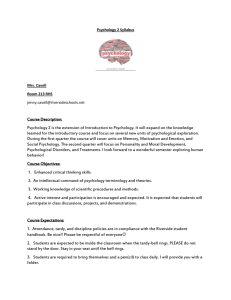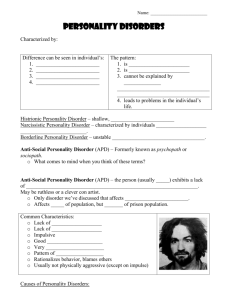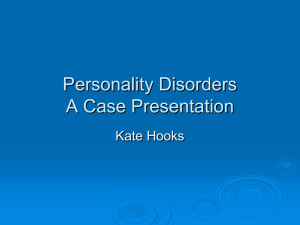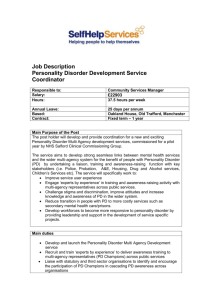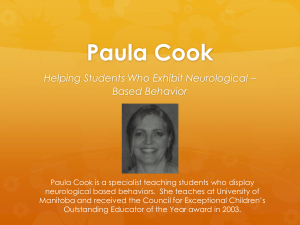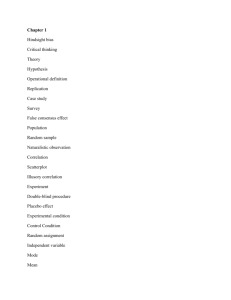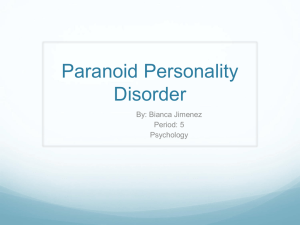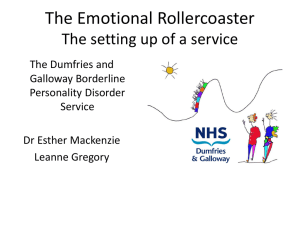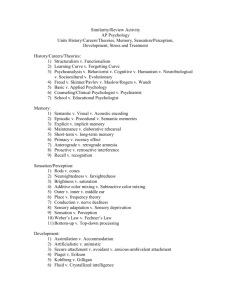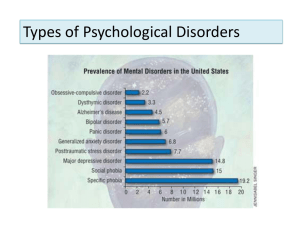Final Review Sheet answers
advertisement
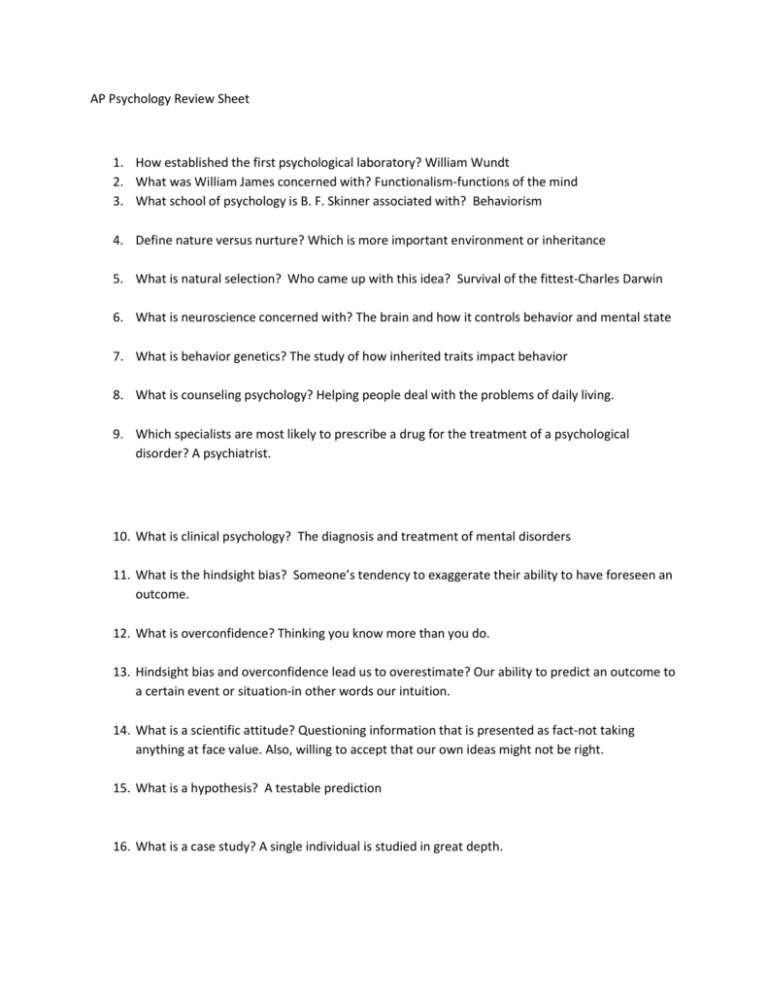
AP Psychology Review Sheet 1. How established the first psychological laboratory? William Wundt 2. What was William James concerned with? Functionalism-functions of the mind 3. What school of psychology is B. F. Skinner associated with? Behaviorism 4. Define nature versus nurture? Which is more important environment or inheritance 5. What is natural selection? Who came up with this idea? Survival of the fittest-Charles Darwin 6. What is neuroscience concerned with? The brain and how it controls behavior and mental state 7. What is behavior genetics? The study of how inherited traits impact behavior 8. What is counseling psychology? Helping people deal with the problems of daily living. 9. Which specialists are most likely to prescribe a drug for the treatment of a psychological disorder? A psychiatrist. 10. What is clinical psychology? The diagnosis and treatment of mental disorders 11. What is the hindsight bias? Someone’s tendency to exaggerate their ability to have foreseen an outcome. 12. What is overconfidence? Thinking you know more than you do. 13. Hindsight bias and overconfidence lead us to overestimate? Our ability to predict an outcome to a certain event or situation-in other words our intuition. 14. What is a scientific attitude? Questioning information that is presented as fact-not taking anything at face value. Also, willing to accept that our own ideas might not be right. 15. What is a hypothesis? A testable prediction 16. What is a case study? A single individual is studied in great depth. 17. What is a survey? A random sample of people are asked to answer questions about their behaviors or attitudes. 18. What is naturalistic observation? Observing the behavior of a person or animal in their natural environment. 19. What is correlation? A measure of the extent to which two variables vary together 20. What happens when you conduct an experiment? You manipulate on factor in order to observe its effect on some behavior or mental process. 21. What is phrenology? Studied the shape of the brain and possible malformations of the school to try and predict behavior and the functions of specific brain regions. 22. Which neurons carry information to the spinal cord? Sensory neurons 23. What is action potential? A brief electrical charge that travels done the axon of a neuron 24. What are the two major divisions of the nervous system? Central and peripheral 25. What does the central nervous system consist of? Brain and spinal cord 26. What is a reflex? A simple automatic, inborn response to a sensory stimulus. 27. What are hormones? The chemical messengers of the endocrine system. 28. What is brain plasticity? The capacity of one brain area to take over the functions of another damaged brain area. 29. What is master gland of the endocrine system? The pituitary gland 30. The sensory cortex is most critical for which sense? Touch 31. What is behaviorism? Interested in behavior not consciousness or motivation. 32. Define consciousness-our awareness of ourselves and our environment. 33. What is dual processing? Processing on both the conscious and unconscious level. 34. What is selective attention? Our inability to process all the sensory information available to us at any given time. 35. What is inattentional blindness? Our inability to focus on one thing when our attentions is focused elsewhere. 36. What is circadian rhythm? A pattern of biological functioning that occurs on a 24 hour cycle. 37. What problems does chronic sleep deprivation cause? Obesity and impaired memory 38. What is sleep-how many stages does it have? Periodic natural loss of consciousness-5 distinct stages 39. Who are most likely to experience night terrors and sleepwalking? children 40. What is hypnosis? Impaired state of consciousness prompted by heightened openness to suggestion. 41. What causes identical twins? A single egg fertilized by a single sperm cell which splits in two. 42. What is behavior genetics? The study of the relative power and limits of genetic and environmental influences on behavior and personality traits. 43. What does temperament refer to in an infant? Emotional excitability 44. What is heritability? Trait differences among individuals attributable to genetic variations. 45. What is a mutation? A random error in gene replication 46. What is personal space? The distance we like to maintain between ourselves and other people. 47. Describe a collectivist culture-its all about the group and what is best for the group. 48. What is a norm-rules for socially accepted behavior. 49. What is a role-Behaviors expected of those who occupy a particular social position. 50. What is gender identity? The sense of being male or female. 51. What do developmental psychologists study? Physical, cognitive and social changes through out the lifespan. 52. What is cognition? The mental activities linked to thinking, knowing, remembering and communicating. 53. What occurs during Piaget’s formal operational stage? The ability to reason abstractly. 54. Which psychologist has had the most influence on our understanding of cognitive development? Piaget 55. Describe secure attachment in children-children’s sense that their parents are trustworthy and dependable. 56. Describe the three different parenting styles-advantages and disadvantages-authoritarian, authoritative, and permissive. 57. Describe Kohlberg’s theory-Moral Development-behavior becomes less selfishness as we mature due to cognitive development. 58. According to Erikson, which stage involved achieving a sense of identity-adolescence 59. Alzheimer’s disease involves a deterioration of neurons that produce ___acetylcholine___________________ 60. What is fluid intelligence? The ability to reason speedily and abstractly. 61. What is crystallized intelligence? –accumulated knowledge and verbal skills. 62. What is perception? The process by which sensory input is organized and interpreted. 63. What is sensory adaptation? Diminishing sensitivity to an unchanging stimulus. 64. What transmits ear drum vibrations? Three tiny bones located in the middle ear. 65. What four basic sensations does the sense of touch include? Pressure, pain, warmth and cold. 66. What brain chemicals reduce pain? endorphins 67. What is a gestalt? An organized whole 68. What is the perceptual tendency of closure? Filling in gaps in order to perceive disconnected parts as a whole object. 69. Who was the first to use psychological therapy? Sigmund Freud. 70. What type of therapy was influenced by research on the principles of learning? Behavior Therapy. 71. What is deviant behavior? Ongoing pattern of behavior that is different from those of most other people in your culture. 72. What is ADHD?-Characterized by inattention, hyperactivity and impulsivity. 73. What is a phobia? An immediate and irrational anxiety response to a certain object or situation. 74. What is an obsession? Offensive and unwanted thoughts that persistently preoccupy a person. 75. What is a somatoform disorder? A psychological disorder in which the symptoms take a bodily form without apparent physical cause. 76. What is personality? An individual’s characteristic pattern of thinking, feeling and acting 77. What is free association? A method of therapy where the person relates what ever thoughts come into their head. Sometimes used with a system of code words. 78. What is the superego? Our sense of right and wrong and our ideal standards of behavior. 79. What is the MMPI? A personality inventory. 80. Describe the Big Five Trait Dimensions –Canoe-conscientiousness, agreeableness, neuroticism, openness and extraversion. 81. Who was the first to conduct experimental studies of associative learning? Pavlov 82. Describe Pavlov’s experiment? Classical conditioning-dog-salivating to the metronome. 83. What is extrinsic motivation? The desire to perform a behavior due to promised rewards or threats of punishment. 84. What is modeling? Someone doing something because someone else is doing it. 85. What is a fixed ratio schedule of reinforcement? A response is reinforced after a specified number of responses have been made. 86. What is observational learning? When children learn something new by observing others. 87. What is a fixed- interval schedule of reinforcement? A response is reinforced after a specified time period has elapsed. 88. What is Maslow’s theory of self actualization? The desire to fulfill your potential as a human being. 89. According to Freud, what is the unconscious? The thoughts, wishes, feelings, and memories of which we are largely unaware. 90. What do personality inventories assess? Several personality traits at the same time. 91. What is dissociative identity disorder? Exhibits two of more distinct and alternating personalities. 92. What is major depressive disorder? Symptoms include feeling worthless, hopeless and a sense of extreme lethargy. 93. What is bi polar disorder? People alternate between states of depression and mania or overexcitement. 94. What is paranoid schizophrenia? Think that someone has ought to get them95. What is schizophrenia?-Has delusions, hears voices. Can think they are someone famous-often times thinks someone is out to get them. 96. What is the newer tern for psychopath? Antisocial personality disorder. 97. Describe antisocial personality disorder –Lack of guilt for hurting others-no sense of empathy. 98. What is post-traumatic stress disorder? Profound depression and anxiety after dealing with a stressful situation. 99. What is post-traumatic growth? Positive psychological changes that result from struggling with extremely challenging life crises.
